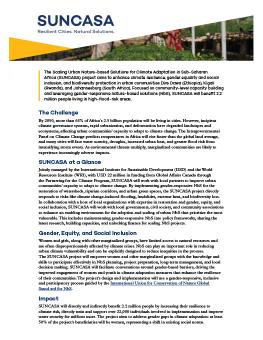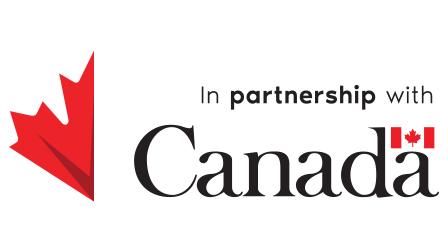
SUNCASA Project Overview
Resilient Cities. Natural Solutions
The Scaling Urban Nature-based Solutions for Climate Adaptation in Sub-Saharan Africa (SUNCASA) project aims to enhance climate resilience, gender equality and social inclusion, and biodiversity protection in urban communities in Dire Dawa (Ethiopia), Kigali (Rwanda), and Johannesburg (South Africa). Focused on community-level capacity building and leveraging gender-responsive nature-based solutions (NbS), SUNCASA will benefit 2.2 million people living in high-flood-risk areas.
Jointly managed by IISD and the World Resources Institute (WRI), with USD 22 million in funding from Global Affairs Canada through the Partnering for the Climate program, SUNCASA will work with local partners to improve urban communities' capacity to adapt to climate change. By implementing gender-responsive NbS for the restoration of watersheds, riparian corridors, and urban green spaces, the SUNCASA project directly responds to risks like climate change-induced flooding, landslides, extreme heat, and biodiversity loss.
You might also be interested in
IISD Annual Report 2023–2024
While IISD's reputation as a convenor, a trusted thought leader, and a go-to source on key issues within the sustainable development field is stronger than ever, the work happening outside the spotlight is just as valuable.
COP 16 in Cali Delivers Key Outcomes for Nature but Questions Remain on Funding
There were some very real wins, and the Colombian government should be applauded for the energy, coordination, and strong sense of community that they brought to the conference as well as to the profile of biodiversity. But the lack of progress on some key negotiation items is concerning.
How to Make Nature-Based Solutions for Adaptation Work for Everyone
Effective nature-based solutions (NbS) for adaptation start with integrated climate risk assessments. These take-aways will help practitioners plan for inclusive and sustainable NbS.
Inclusive Nature-Based Solutions for Climate Adaptation
Discover how climate change and biodiversity loss impact people differently and how inclusive nature-based solutions for adaptation can help.
